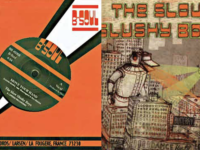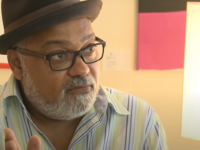News that John Legend will recreate Marvin Gaye’s 1972 concert at the Kennedy Center, one that’s believed to have included the only complete performance of his groundbreaking 1971 album What’s Going On, had us digging out the old vinyl. Legend’s Gaye tribute is set for two dates in May, alongside the National Symphony Orchestra and others. It will commemorate Gaye’s first live performance in two years, following the passing of Gaye’s duet partner and close friend Tammi Terrell, but also an album that faced head on the issues of the day — in a manner unlike any Motown release that had come before. Here’s a look back at Gaye’s groundbreaking release What’s Going On …
They should sing these songs in church.
Marvin Gaye’s What’s Going On doesn’t simply boast the gospel influence that marks so much of America’s most transformative works in blues and R&B, the album actually has the consistently challenging depth and heart-opening heft of sacred music.
Turbulently emotional, but sure of its wider values, What’s Going On is one of rock music’s most complex joys — and one of the 1970s’ most important records. Not just because of its timeless themes on the issue of conflict (“war is not the answer,” Gaye famously sings; “only love can conquer hate”) and conservation but also its biting exploration of social injustice — and how brotherly compassion can bolster those fighting their way out of these earth-bound travails.
Marvin Gaye had already broken ranks with the Motown label’s smoothly processed hitmaking dynamic after scoring big with a radical reworking of Whitfield and Strong’s “I Heard It Through the Grapevine”: Once a lighthearted nod to romantic paranoia, it became in Gaye’s vocal a glimpse into the shadowed heart of a bereft emotional wreck. That success in 1968 earned Gaye, now sporting a once-verboten wisp of facial hair, the right to plunge deeper into an exploration of his roiling emotional state.
His days were complicated by a foundering marriage, the difficult illness and death of his longtime signing partner Tammi Terrell and his own feelings about the wrong-headed initiative in Vietnam. Gaye’s brother Frankie was unhappily serving in the military, and Marvin used that as a platform for this album’s title track — an intimate experiment in multi-layered vocalization, subtle Latin grooves and this-just-in social consciousness.
The mile markers of America’s then-growing discontent continue to rush by as Gaye dives into his masterwork: He notes “picket lines, and picket signs,” as veterans are derisively greeted upon their return. Elsewhere, those who remained “can’t find no job, my friend/money is tighter than it’s ever been.” Even “Mercy, Mercy Me,” which lists the planet’s many eco-problems over an hypnotic rhythm, ends with a dark question: “How much more can she stand?” But songs like “Save the Children” arrive as heartfelt counterbalances to these foreboding portents: “Save the babies!,” Gaye cries, shattering whatever hopelessness might have seeped into the record. God loves us, he later surmises, “whether or not we know it, and he’ll forgive all our sins.”
Gaye embraces this world, and this moment, as a bridge to sweet salvation — perhaps nowhere more so than on the complex (both rhythmically and lyrically) “Wholy Holy”: “Holler love,” Gaye sings, “across the nation.” In this way, he finds a cathedral inside his own chest, this fragile flowering of hope fighting its way through the concrete jungle.
There follows, of course, this seemingly dire warning to ends Gaye’s project — “Inner City Blues” focuses on the powers that be, and “the way they do my life” — but, to me, it always felt like a cautionary tale to underscore the beauty that came before. Like what might befall those who don’t embrace both Gaye’s call toward examination and the redemption that can most assuredly follow. Like the title track and “Mercy, Mercy Me,” this concluding song would make a remarkable run up both the R&B and pop charts in the early 1970s, forever establishing Gaye as an individual artist in his own right.
Even today, though, they jump out of the radio, crackling not just with hard-eyed truths but also with a rare and lingering idealism for such a serious recording: Gaye’s “What’s Going On,” a pillowy subtle religious statement throughout, remains Marvin’s lasting document of faith — an eternal call to love.
[amazon_enhanced asin=”B004V7XWEE” container=”” container_class=”” price=”All” background_color=”FFFFFF” link_color=”000000″ text_color=”0000FF” /] [amazon_enhanced asin=”B00004T9UK” container=”” container_class=”” price=”All” background_color=”FFFFFF” link_color=”000000″ text_color=”0000FF” /] [amazon_enhanced asin=”B0000060NL” container=”” container_class=”” price=”All” background_color=”FFFFFF” link_color=”000000″ text_color=”0000FF” /] [amazon_enhanced asin=”B00007FOMP” container=”” container_class=”” price=”All” background_color=”FFFFFF” link_color=”000000″ text_color=”0000FF” /] [amazon_enhanced asin=”B0000060NN” container=”” container_class=”” price=”All” background_color=”FFFFFF” link_color=”000000″ text_color=”0000FF” /]
- Nick DeRiso’s Best of 2015 (Rock + Pop): Death Cab for Cutie, Joe Jackson, Toto + Others - January 18, 2016
- Nick DeRiso’s Best of 2015 (Blues, Jazz + R&B): Boz Scaggs, Gavin Harrison, Alabama Shakes - January 10, 2016
- Nick DeRiso’s Best of 2015 (Reissues + Live): John Oates, Led Zeppelin, Yes, Faces + others - January 7, 2016




